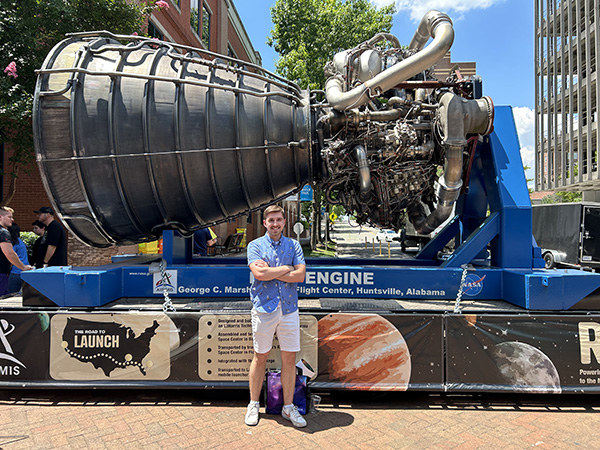Robotics Engineering major and NASA intern hopes to use robotics to help solve issues in the environment, space exploration: a Q-and-A with Bradley Gartner
The Miami University senior worked on a team to develop a new version of a tethered spacecraft simulator during his internship at the Marshall Space Flight Center

Robotics Engineering major and NASA intern hopes to use robotics to help solve issues in the environment, space exploration: a Q-and-A with Bradley Gartner
Bradley Gartner is a senior at Miami University majoring in Robotics Engineering. He completed an internship this summer with NASA at the George C. Marshall Space Flight Center in Huntsville, Alabama.
The president of Miami’s Robotics and Automation Club has been involved in research for more than two years. He started as a summer research intern at Lakeland Community College, where he earned an associate of science and conducted research on the benefits of robotics in agriculture using hydroponic systems. He attended Carnegie Mellon University in 2021 as a Mechanical Engineering student before transferring to Miami University.
In summer 2023, Gartner was a research intern at the University of Georgia, collaborating with a team to develop an autonomous rover and drone designed to navigate through farm fields. The goal was to collect data to support farmers in their resource allocation decisions and improve crop health.
Now leading Miami’s Robotics and Automation Club, he continues to research creative and efficient ways to improve farming techniques using drones and rovers to improve ways to produce food and protect the environment.
We caught up with Gartner, of Chardon, Ohio, to find out more about the Robotics Club, his NASA internship, and his overall experience at Miami.
Why did you choose Robotics Engineering as a major, and what do you hope to do after graduation?
I have always had a love for robotics. Requiring multiple aspects of engineering to design and control robots provides unique and interesting challenges. In addition, robotics can provide solutions to problems I am hopeful to solve such as space exploration and helping the environment.
After graduation, I plan on attending graduate school and hope to start a career at NASA with the hope of becoming an astronaut in the future.
Tell me about your summer internship at the George C. Marshall Space Flight Center. What was it like, and what kinds of things did you get to do?
During my internship, I worked on developing a new version of a tethered spacecraft simulator. This robot could be used to test performing tasks such as autonomous docking, space laser welding, and space debris capture. The robot was attached to a tether to test how a spacecraft reacts when connected to an actuated tether and being pulled back to its starting position.
Any big takeaways from that experience?
This experience taught me how important being creative is and how failures are beneficial. This project required thinking outside the box since it had various constraints and was being utilized in a unique environment.
Many tests resulted in failures and new problems. While this was frustrating, I learned more from working through these problems with my team, and it showed me the importance of teamwork, project management, and focusing on the positives in bad situations.
The Robotics and Automation Club received a $12,000 grant from the Women’s Giving Circle last year to help fund work applying robotics to agriculture. Why is that research area important to you?
The research focus is important to me because as the population grows, we will need more food, but we are limited to how much land we have. In order to prevent this issue, farming techniques need to be improved on the farmland we already have to ensure maximum yields and minimum resources used.
Robotics can help by providing data to farmers or performing specific tasks such as weeding to help farmers make the best decisions on resource and crop management.
Are you from a farming background?
I am not, but I love the outdoors and wanted to find a way to combine my engineering passion with my passion for the environment.
Finally, why did you choose Miami and what has your experience been like?
I was interested in Miami's Robotics Engineering program and my experience has been amazing. I had the opportunity to create my own opportunities, which resulted in me running the Robotics Club and starting a new research area through the robotics program.
For more Miami news, go to MiamiOH.edu/news.